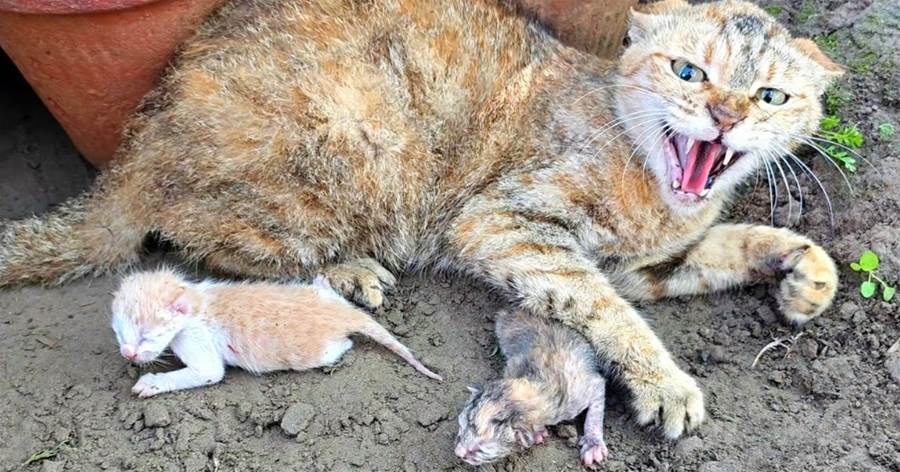
Angry Mother Cat Protects Her Kittens and Doesn't Let Anyone Approach Them
In the quiet corner of a backyard, a fierce protector has taken center stage. She’s small, with a sleek coat and a sharp glare, but this mother cat has a heart as big as a lion. Anyone who dares approach her litter of kittens is met with a hiss, a swipe of her paw, and a display of sheer feline ferocity. And no, she isn’t kidding around. What could be fueling this strong maternal instinct?
For a cat, especially one living outdoors, survival is no easy feat.
Her kittens are everything to her at this stage, and she's well aware that they are vulnerable. Their eyes may still be closed, their limbs fragile, and they depend entirely on their mother for food, warmth, and safety. Even a curious human walking too close could be seen as a threat.
Maternal instincts run deep across the animal kingdom, but in cats, it can take on a level of intensity that surprises many. The moment she gave birth, this mother cat’s entire focus shifted to one thing: keeping her kittens alive. This means anyone — whether it’s a neighborhood dog, another cat, or even the well-meaning humans offering food — will be met with the same defensive energy.
“She’s normally so sweet,” her owner might say, baffled at the sudden transformation. But anyone who has ever seen a mother cat in protective mode knows that this isn’t about personality; it’s about survival.
But why such extreme measures? Well, for starters, newborn kittens are essentially defenseless. They can’t regulate their own body temperature, and they need to nurse frequently. In the wild or even in urban environments, danger is everywhere. A mother cat’s job is to make sure no harm comes to her little ones. Her heightened aggression is her way of saying, "I will protect my babies at all costs.
Interestingly, this protective phase doesn't last forever. As the kittens grow older, you’ll likely see her gradually relaxing her guard. At about four to six weeks, when the kittens start becoming more independent, she may let visitors or even other cats get a little closer. But for now? Keep your distance.
When faced with an angry mother cat, many people wonder if they should step in and try to calm her down or even separate her from her kittens temporarily. While it might seem helpful to intervene, it’s generally best to let the mother cat handle things her own way — at least for the first few weeks.
“She’s just doing what comes naturally,” animal behaviorists often explain. Trying to remove the kittens or force interaction can create even more stress for the mother, which might worsen her aggression. Instead, providing her with a safe, quiet space away from too much foot traffic will help her feel secure and less anxious about perceived threats.
One thing’s for sure: the bond between a mother cat and her kittens is powerful. It’s a connection driven by biology but fueled by an unbreakable will to protect. This cat may not be the cuddly, affectionate companion her owners are used to right now, but her fierce devotion speaks volumes.
As the weeks pass, and the kittens start to explore their world, you might catch the mother cat letting them wander just a little bit further from her. But don’t be fooled — she’s still watching, and if anything looks even remotely dangerous, she’ll be right there to shield them once again.
Soon, the tiny balls of fur will grow more adventurous, and the mother cat will slowly loosen her grip. You’ll notice the kittens playing, tumbling around, and even interacting with other animals or humans. At this point, the mother cat’s aggression will diminish, and she’ll likely return to her sweet, calm self. Until then, respect her space — she’s got a job to do, and she’s doing it well.
In the meantime, have you ever witnessed a protective animal like this mother cat? Share your thoughts and experiences — we'd love to hear your stories about nature’s fiercest protectors!



















